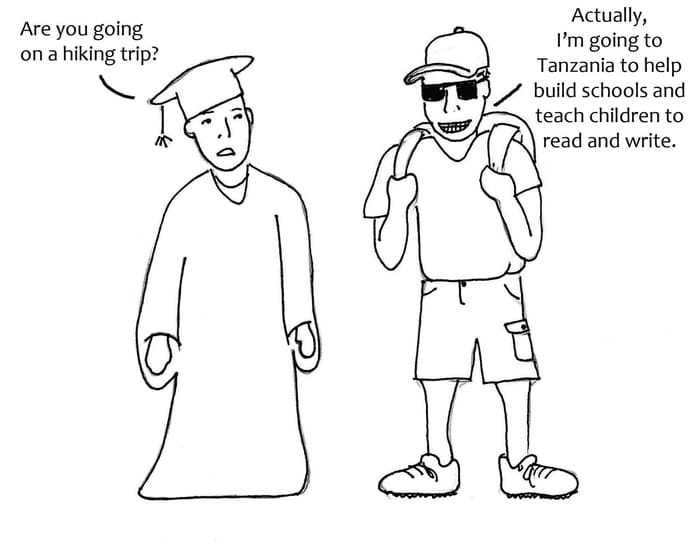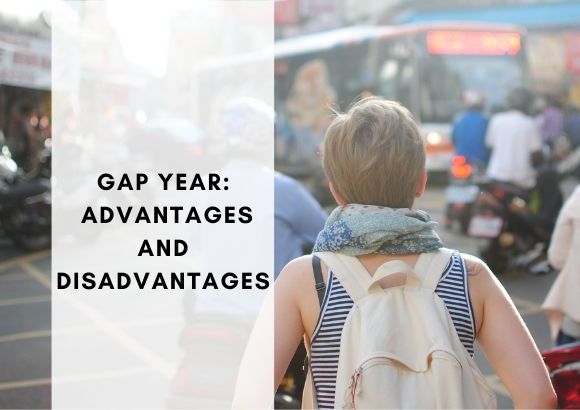What is a Gap Year, What are Its Advantages and Disadvantages?
Published by SchoolAdvisor | Mar 15, 2021Your child has decided to take a year off college or university? Good! Now, you need to get yourself fully prepared— or at least as prepared as you can be for what may lie ahead for your child and yourself. Here's a round-up of the concept of gap year and its advantages and disadvantages you need to know about taking a gap year.

Photo by Steven Lewis on Unsplash
Firstly, what is a Gap Year!? Why has it gained so much attention?
A gap year is usually a constructive 12-month break taken from study or work in order for the individual to pursue other interests, which are generally different from their regular life or line of study or work.
Although gap year is not widely practised in Malaysia, the Higher Education Ministry has begun implementing the Gap Year initiative since September 2017 which allows undergraduate students to take a gap year during the course of their degree programmes.
The then Higher Education Minister, Idris Jusoh, said that students who are interested in taking part in the programme had many options open to them. This is because the Ministry has laid out three different gap year programmes that students can participate in.
The different programmes are Gap Year National Service Volunteerism, Gap Year Volunteerism and Gap Year (general). What are these programmes and which one is the right one for your child?
Gap Year National Service Volunteerism is suitable for students who are keen to polish their leadership skills as this programme allows them to join Malaysian Armed Forces (MAF), Royal Malaysia Police (PDRM) and Malaysia Civil Defence Force (APM) for a year.
Gap Year Volunteerism would make the right fit for students who enjoy volunteering and getting involved in grassroots activities. This programme provides a platform for students to work with government agencies such as Islamic Relief Malaysia, Department of Social Welfare, Department of Orang Asli Development and many more.
Gap Year (general) is probably the most favourable programme for students who want to spend the year focusing on their passion as it gives students the opportunity to engage in activities that are of their personal interest such as sports, work, travelling and others.
The gap year is a common practice in the United Kingdom and the United States of America, where students take a year off after completing secondary school, usually to travel, before commencing their studies at university. However, the scheme, which commenced in September 2017, is only open to undergraduates who have completed at least the first year of their studies.

Why take a gap year?
There are many reasons why you might want your child to take a gap year. Typically, students view it as an opportunity to gain professional or personal experience, achieve specific goals and/or explore personal interests. If your child is considering taking a gap year, it is important to think carefully about whether it is the right decision and what he or she might gain from it.
When planning a gap year, students should consider how various activities will help develop them personally and intellectually, contribute to a good cause, gain a deeper understanding of the world, develop enterprise, maturity, commitment and independence outside of formal education.
Here are some reasons why taking a gap year is a good idea:
Earn some money

Photo by Josh Appel on Unsplash
Children these days are independent and they might want to look for a part-time job before they continue their studies as the financial security will give them the freedom to live the student life as best as they see fit. Going out to fancy cafes with friends or going on a road trip will not be a problem when they know they can cover those expenses on their own.
Develop useful contacts

Photo by Patricia Zavala on Unsplash
During their defer year, students are likely to meet a range of different people from all walks of life. This could include people they can call on for job opportunities and references, or simply some international friends whose sofas they can crash on if they get the chance to visit their home country later. Speaking of which…
Make international friends

Photo by Priscilla Du Preez on Unsplash
Living and working alongside local people during a year off abroad can mean students will really get to know them, allowing them to develop a nuanced understanding of different cultures and perspectives. Students will meet all sorts of people and, if they hit it off with them, they might even gain lifelong friends.
Improve employability with key skills
Students will be able to work during the year off to develop plenty of transferable skills that will make them more attractive to university admissions officers and future employers. These key skills include organisation, communication, teamwork, independence, social skills, decision-making, self-sufficiency, time management, and budgeting.
Challenge yourself
Students are adventurous and that is a fact. Many students take the gap year to tackle challenges they have set for themselves, step out of their comfort zone, face their fears and enjoy new experiences. They might even decide to go trekking through a jungle, climb a mountain for charity, volunteer in a developing country, or go scuba diving, skiing or snowboarding.
Take time out between school and further studies

Photo by Anthony Tran on Unsplash
Taking a break before entering the workforce can help students feel refreshed, energised and ready to tackle their courses. Many foreign institutions report that students who have taken a gap year come back with a more mature attitude to study independently. A gap year can help ensure that your child will come back with the focus, clarity and drive necessary to resume a degree programme.
Improve and gain new life skills
This can be anything from learning and becoming fluent in a foreign language, becoming an instructor in an adventure sport, boosting IT skills or learning how to teach English as a foreign language (TEFL).
Do something worthwhile

Photo by Anna Earl on Unsplash
Many students think of their gap year as an opportunity to do something worthwhile, such as volunteering with a charity either locally or abroad. Students also feel that they need to take the opportunity to take a drop year when they can, before too many commitments start tying them down to one place after they begin entering the workforce.
Disadvantages of a gap year
While there are many benefits to taking a gap year, it’s worth considering that there are also risks involved. Some of the disadvantages of a gap year your child might encounter include:
- It can cost a lot of money to organise and realise activities during gap year.
- Your child may get injured or sick during their travels.
- They might find their break too interesting/distracting, and end up not wanting to go back into formal education.
- Their study skills may have diminished, thus making it harder for them to adjust to life in education. This can be particularly true for mathematics or physics students, or any course that involves complex theoretical processes and techniques that may not be used outside of the classroom.
- Some institutions do not look favourably upon drop year students, particularly if they did not incorporate enough constructive activities into their year off.
- Travelling for a long period of time can be difficult and uncomfortable, and the daily challenges of adjusting to a new environment can be emotional.
- They may simply find that they did not get the experience they were hoping for.
Undeniably, gap year has its own pros and cons. Thus, it is important for you as a parent to sit down and have a conversation with your child whether or not taking the gap year will make them more driven and motivated to pursue their dreams. In the end, this decision will have a direct impact on them more than you.
Recent Articles
- Beaconhouse Gasing Preschool: Leading Transformation with IEYC Curriculum Introduction
- BSKL and Charterhouse Grad Scores Dream Spot at New York University
- Leannie Liew’s Journey at Cempaka International School: Pushing Boundaries and Discovering Potential
- VOX ISKL: Leveraging Language Learning
- From elc to Harvard: Thamini Vijeyasingam’s Journey to Ivy League Excellence







 Login with Google
Login with Google